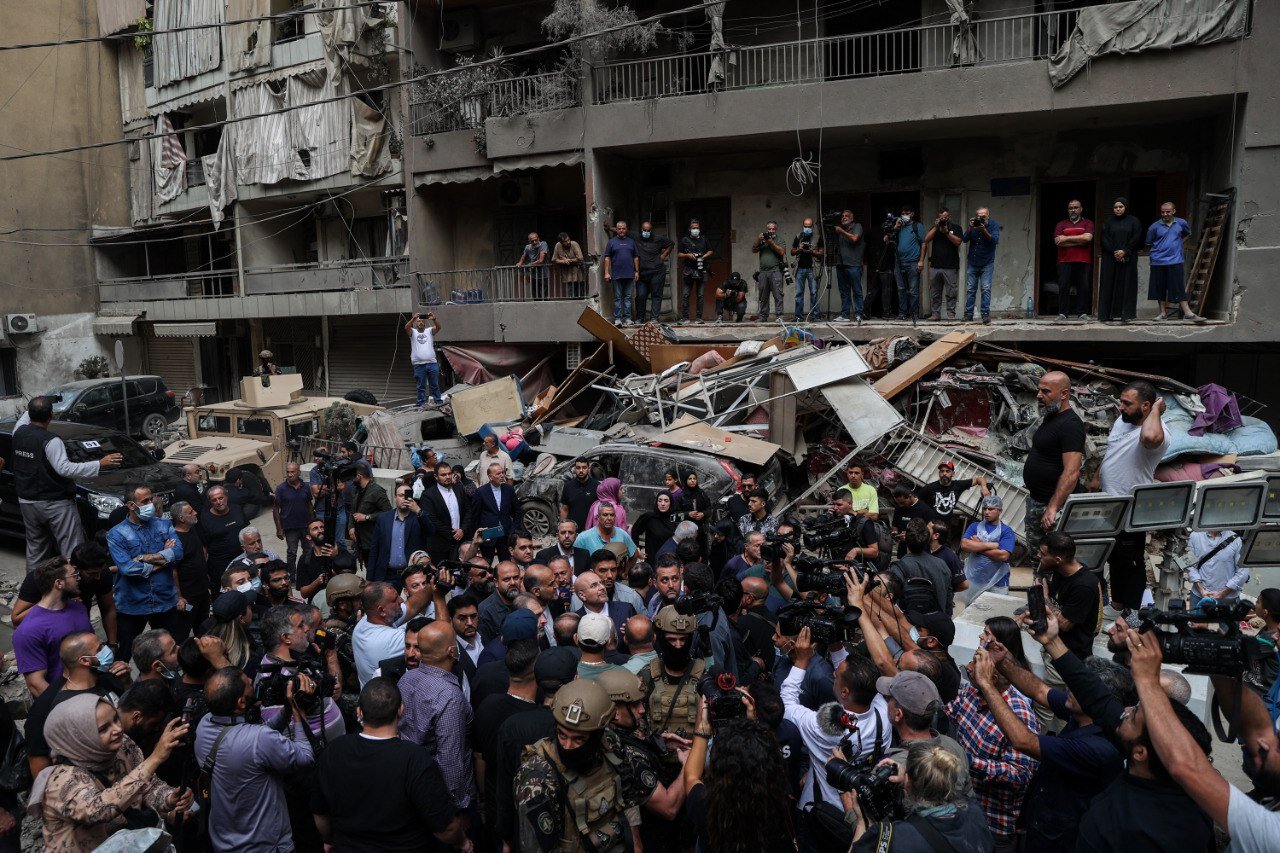With you we will go on and triumph
Qalibaf's visit to Beirut a bold show of Iran’s commitment to supporting Lebanon

TEHRAN – A thick pall of smoke hung heavy over Beirut as Iranian Parliament Speaker Mohammad Baqer Qalibaf, at the controls of his own plane, touched down at Rafic Hariri Airport on Saturday.
The Iranian official then walked through the smoldering ruins of the southern suburbs of the Lebanese capital. The once-vibrant neighborhoods have been under constant Israeli airstrikes in the past 15 days after the regime assassinated Hezbollah Secretary-General Sayyad Hassan Nasrallah using 85 tons of American bombs.
The residents emerging from their damaged homes to catch a glimpse of the parliament speaker told reporters that they were feeling joy and hope for the first time since losing their beloved leader. "It feels good," said a young mother as she stood next to her two children on the shattered porch of their home, "to know we're not forgotten."
Hossein Pak, an Iranian journalist reporting from Lebanon for the past year, says Qalibaf’s visit to Beirut, with Israeli fighter jets and drones still raining down on civilians, was an unexpected but deeply appreciated move.
"This is where the Iranian parliament speaker chose to be," Pak stated, his camera panning across the piles of rubble just meters away from Qalibaf, who was surrounded by a throng of people. "Less than 48 hours ago, Israel bombed this very area. The enemy drones are still circling overhead. Visiting such a place to show support for the Lebanese takes courage. It's not for the faint of heart, it's something only a true fighter would do."
Qalibaf is a seasoned veteran of both Iranian politics and the military. At just 22 years old, he commanded a division of the Islamic Revolution Guard Corps (IRGC) during the Iran-Iraq war. After years of distinguished service in the IRGC, including a stint as commander of the IRGC Air Force, he transitioned to the political arena. To many in Lebanon, Qalibaf is known as a close friend of Lieutenant General Qassem Soleimani, Iran’s legendary anti-terror commander who vanquished Daesh terrorists in West Asia during the 2010s.
Qalibaf's visit followed closely on the heels of another high-profile trip by a former IRGC member, Iranian Foreign Minister Abbas Araqchi, who had also made the journey to Beirut under the same perilous conditions.
Both Qalibaf and Araqchi told reporters in Beirut that their presence in the Arab country was a show of support for the Lebanese.
"I have come from Tehran, bearing the warm greetings of the Iranian people, and especially the message of the Leader of the Islamic Revolution, to the people of Lebanon," the parliament speaker said while addressing a press conference outside Iran’s embassy in Beirut following a meeting with his Lebanese counterpart. "Iran stands firmly with the Lebanese nation and government in these challenging times. We will fully support the decisions of the Lebanese government, people, and Resistance.”
A look at the bigger picture
The recent flurry of high-ranking Iranian officials arriving in Beirut, one after another, must be understood within the larger context of the current regional landscape and the ambitions of Israel and its Western allies.
Tensions are at a boiling point as Israel, having reduced Gaza to rubble, now sets its sights on replicating that destruction in other parts of the region, particularly Lebanon. Despite failing to decisively defeat Hamas, the images of devastation in Gaza present a manufactured narrative of victory. Israel's focus now shifts to its other major adversary, Hezbollah, which has effectively cleared Israelis from the northern parts of the occupied territories through unabating successful attacks.
Israel understands that Hezbollah will not relent its attacks until a ceasefire is established in Gaza. With Benjamin Netanyahu showing no signs of agreeing to a ceasefire anytime soon, the Israeli regime is seeking to find a way to militarily defeat the Resistance group. The first, and perhaps most critical, step in this plan is to demoralize the Lebanese fighters. The assassination of Nasrallah on September 27 marked the first stage of this strategy. The second phase aims to convince Hezbollah fighters that Iran, the mainstay of the Resistance, has abandoned them.
Iran's decisive missile attack against Israeli military bases in the occupied territories on October 1 dealt a heavy blow to this narrative of abandonment. With Iran's highest-ranking officials risking their lives to travel to Beirut, the disjoint Israel hopes to create between Tehran and the rest of the Axis of Resistance is becoming more and more unlikely.
“This trip serves as a powerful demonstration of support for the people of Lebanon and the Resistance Axis. The Islamic Republic has made it clear that it will stand with the Resistance and the oppressed nation of Lebanon, no matter the circumstances. We believe lasting peace in the region can only be achieved through unwavering strength and a clear willingness to defend against threats,” expressed an Iranian lawmaker when asked about Qalibaf’s recent visit.
